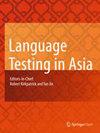An intelligent vocabulary size measurement method for second language learner
IF 2.5
1区 文学
Q1 EDUCATION & EDUCATIONAL RESEARCH
引用次数: 0
Abstract
Abstract This paper presents a new method for accurately measuring the vocabulary size of second language (L2) learners. Traditional vocabulary size tests (VSTs) are limited in capturing a tester’s vocabulary and are often population-specific. To overcome these issues, we propose an intelligent vocabulary size measurement method that utilizes massive robot testers. They are equipped with randomized and word-frequency-based vocabularies to simulate L2 learners’ variant vocabularies. An intelligent vocabulary size test (IVST) is developed to precisely measure vocabulary size for any population. The robot testers “take” the IVST, which dynamically generates quizzes with varying levels of difficulty adapted to the estimated tester’s vocabulary size in real-time using an artificial neural network (ANN) through iterative learning. The effectiveness of the IVST is factually verified by their visible vocabularies. Additionally, we apply a long short-term memory (LSTM) model to further enhance the method’s performance. The proposed method has demonstrated high reliability and effectiveness, achieving accuracies of 98.47% for the IVST and 99.87% for the IVST with LSTM. This novel approach provides a more precise and reliable method for measuring vocabulary size in L2 learners compared to traditional VSTs, offering potential benefits to language learners and educators.一种面向第二语言学习者的智能词汇量测量方法
摘要本文提出了一种准确测量第二语言学习者词汇量的新方法。传统的词汇量测试(VSTs)在捕获测试人员的词汇量方面是有限的,并且通常是针对特定人群的。为了克服这些问题,我们提出了一种利用大型机器人测试器的智能词汇量测量方法。他们配备了随机和基于词频的词汇来模拟二语学习者的变体词汇。开发了智能词汇量测试(IVST)来精确测量任何人群的词汇量。机器人测试人员“接受”IVST,该IVST通过迭代学习,使用人工神经网络(ANN)实时动态生成不同难度水平的测试,以适应测试人员估计的词汇量。IVST的有效性通过其可见的词汇表得到了实际验证。此外,我们还应用了长短期记忆(LSTM)模型来进一步提高方法的性能。该方法具有较高的可靠性和有效性,对IVST的准确率为98.47%,对LSTM的IVST的准确率为99.87%。与传统的vst相比,这种新方法提供了一种更精确、更可靠的测量二语学习者词汇量的方法,为语言学习者和教育工作者提供了潜在的好处。
本文章由计算机程序翻译,如有差异,请以英文原文为准。
求助全文
约1分钟内获得全文
求助全文
来源期刊

Language Testing in Asia
Arts and Humanities-Language and Linguistics
CiteScore
4.00
自引率
28.60%
发文量
50
 求助内容:
求助内容: 应助结果提醒方式:
应助结果提醒方式:


